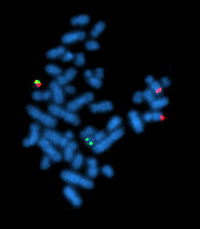
Photo from wikipedia
Introduction: This study aimed to evaluate factors affecting drug survival and treatment response in patients with chronic urticaria treated with omalizumab in clinical practice. Methods: This study included 386 patients… Click to show full abstract
Introduction: This study aimed to evaluate factors affecting drug survival and treatment response in patients with chronic urticaria treated with omalizumab in clinical practice. Methods: This study included 386 patients with chronic urticaria. Demographic characteristics, clinical features, laboratory parameters, and omalizumab treatment data were analyzed retrospectively. The 7-day urticaria activity score (UAS7) and urticaria control test (UCT) were used to assess disease severity and treatment responses. Results: Well-controlled disease (UAS7 ≤6) was achieved in 59.3% of patients at a median of 2 months. Complete response was significantly higher in patients treated with omalizumab for ≥12 months (p < 0.001). Family history of asthma (p = 0.01) was less frequent, and disease duration (p = 0.041) was shorter in patients with well-controlled disease. Total treatment duration was longer in patients with relapse (p < 0.001) and serum Helicobacter pylori IgA positivity (p = 0.029). Discussion/Conclusion: Treatment response is better in patients treated with omalizumab for ≥12 months. However, prolonged treatment does not prevent relapse. Our findings suggest that continuous or intermittent therapy is an appropriate alternative treatment option in patients with severe chronic urticaria; however, continuous therapy can be preferred to maintain the patient’s quality of life.
Journal Title: International Archives of Allergy and Immunology
Year Published: 2022
Link to full text (if available)
Share on Social Media: Sign Up to like & get
recommendations!